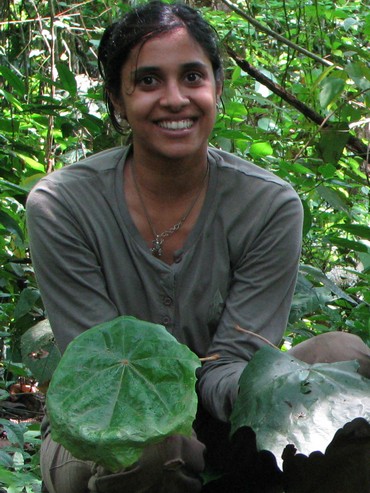
Nandini Velho is a Junior Research Fellow at the National Centre for Biological Sciences in Bangalore.
On most days the 25-year-old wildlife biologist wakes up to chirping birds and a slight drizzle of rain as she steps into her 'office' -- the lush green forests in Arunachal Pradesh.
Nandini, along with her guide and mentor Dr Mahesh Sankaran, has started to engage in a long-term monitoring project at the 865-square km Pakke Tiger Reserve, one of the most biodiverse and relatively intact tropical forests in the world.
She tells you that they have managed to mark and map all trees above 25 cm of GBH (girth at breast height) in a one-hectare plot and now plan to set up weather stations.
Nandini has also studied the effects of logging and how plant-animal interactions change across habitats.
"If someone didn't pay me to do this, I would pay someone to allow me to do this," she tells you, evidently excited about the findings she is to publish soon in a peer-reviewed journal.
Nandini completed her schooling from Goa, her bachelor's degree in Life Sciences from St Xavier's College in Mumbai and has gone on to earn a master's degree in Wildlife Biology and Conservation from NCBS, which runs the course in association with the Wildlife Conservation Society India Programme.
She tells Rediff.com's Abhishek Mande what her job entails, how she went about becoming a wildlife biologist and what qualities you must have to become one.
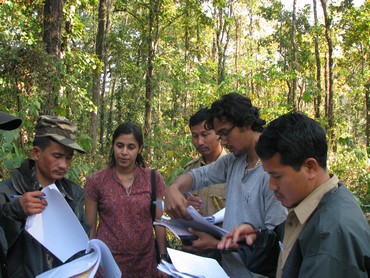
Very often, your job takes you places. Mine took me to the tropical forests of Arunachal Pradesh!
After having collected the data, the biologist has to communicate her/his findings to the outside world in the form of scientific peer-reviewed publications.
I am also passionate about writing in the popular medium (newspapers, magazines and bulletins) so that people are made aware of the key issues in the field.
As a wildlife biologist I also try, as much as I can, to engage with forest managers. Together with them I try and get involved in many knowledge-disseminating initiatives for people around national parks as well as the larger populace.
You have completed your MSc in Wildlife Biology and Conservation from the National Centre for Biological Sciences , Bangalore. Are there any other institutes where one can study a similar course?
Yes, there is the Wildlife Institute of India in Dehradun, which offers a master's programme in Wildlife Science. The admission happens every two years. There is an entrance exam which tests general knowledge, aptitude for science (especially biology), followed by an interview.
The Salim Ali School of Ecology, Pondicherry University, also offers a two-year Master's in Ecology programme and has only an entrance exam for admission.
There are also one-year master's courses offered abroad at colleges like Imperial, Oxford, Cambridge, Leeds, York and Sheffield (all in the UK).
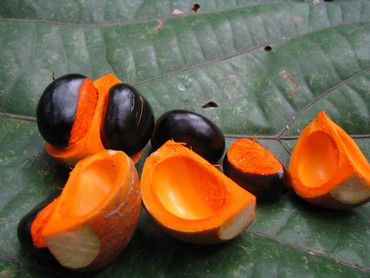
In our master's course, we've had doctors (human and veterinary), engineers and graduates from zoology, biotechnology and even English!
The course at NCBS is rather flexible. But other courses, such as the one in Dehradun, require you to have done your graduation in a stream of biology.
I completed my BSc in Life Sciences because I thought it was a good way to expose me to many streams of biology.
What are the job prospects in this field? How do you rise up the ladder?
Currently the field is so fluid you can choose your area of research and pretty much start your own set-up after you complete your master's degree. But the ideal way to go about it is to work with a senior wildlife biologist.
I work with Mahesh Sankaran, who is associated with NCBS.
You don't start off with a very high salary. A beginner gets a stipend anywhere between Rs 8,000 and Rs 12,000, which is very comfortable and even allows for savings since you're not living in big cities.
Eventually you have the option of completing your doctorate and associating yourself with an organisation.
It also depends on the scale you want to work at. You can work for organisations like the United Nations and the World Bank, which will offer you international exposure but may not necessarily be most effective for wildlife conservation on the ground.
There are also effective national/international NGOs that run conservation programmes such as the Wildlife Conservation Society, World Wildlife Fund for Nature, Wildlife Trust of India and Wildlife Protection Society of India among others for whom you can conduct research.
Besides these, there are institutions within the government like the ministry of environment and forests that are open to people educated in this field.
Also you can always approach organisations that give out grants for various independent projects. If you are a researcher, you need to identify an institution that works in your area of interest.
Here is a small list: https://tinyurl.com/wildlifefunding. There is the Department of Science and Technology in India that is a major source of funding.
If hardcore research doesn't interest you, you can go undercover and try and understand issues related to wildlife trade and poaching nexuses! You could involve yourself in conservation education, do active outreach or work with local state forest departments.
Besides this, you can become a writer or a filmmaker and make documentaries.
So the options available are vast. Most of us are in it for the love of it not so much for the money.
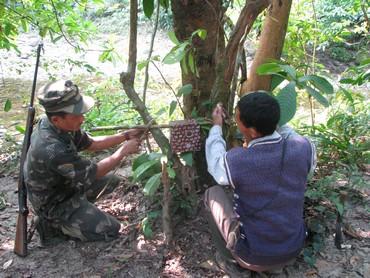
A new day holds the promise of seeing a tiger, spotting herds of elephants or seeing endangered species like the White-winged Wood Duck.
I have watched a hundred hornbills flying above me to their sleeping sites in Pakke, flying squirrels gliding in the high canopy by the moonlight in Dandeli.
Also I quite like the simplicity of the rural life. I've forged bonds with people that will last a lifetime. The locals there are pretty much my second family.
You come from Goa. What was it like adjusting to the forests of Arunachal Pradesh?
You will be surprised by the similarity of the two places. Both have abundant green spaces, the people are welcoming. (Laughs)
I wouldn't say I had a lot of problems adjusting to the life there besides the fact that the place itself is quite remote. The Pakke Tiger Reserve is in the western part of Arunachal Pradesh close to the Assam-Arunachal Pradesh border. Tezpur in Assam is the closest bus station there is with very few buses plying to Pakke.
Most of the time the locals communicate in Hindi because that is the only common language spoken within the region besides Assamese. So language isn't exactly a barrier either.
Also I spend a lot of time with the local kids -- teaching them and showing them movies on a projector or my laptop.
Initially a lot of people were curious about what a girl was doing in the forests. But now they aren't curious anymore. They respect my space but also make sure I am never alone. I've found a second family in Pakke.
What challenges would you say you faced during your years as a wildlife biologist?
I'd always been to places only for a month or so at a time. What I found most difficult while trying to execute projects during extended periods of field work, was having to organise and plan everything from scratch not only for myself but for my field assistants too.
What challenges should aspiring wildlife biologists be prepared for?
You need to be willing and able to rough it out in the field and go through the rigour of scientific method (analysis and peer-review) when back.
More importantly you need to be adaptable. You won't be living in five-star hotels.
Most of the time you are living in a rented house, which at best is a decent place to retire for the night. At times you have to stay in anti-poaching camps overnight or camp outdoors in the forest.
There are the usual occupational hazards of leeches, ticks and mosquitoes that could make your life miserable if you don't take adequate protection measures.
If you decide to do hands-on conservation work, there is little or no good news and it can get highly stressful. Especially if you are working on issues such as wildlife trade, poaching or dealing with community conservation programmes.
All in all, working conditions are harsh and you must be prepared for it.
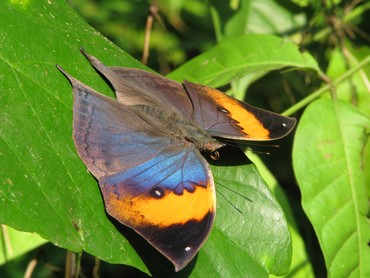
They thought us all kinds of stuff -- from swimming and hiking to planting crops with farmers.
I was a no-bencher most of the time in my pre-university days, enjoyed going to places, playing sports and exploring good food places.
Could you tell us something about your family? What did they have to say about your choice of career?
They have the natural worry of parents and relatives but are very supportive in general.
My father is a complete outdoor freak. Come rain or sunshine, insulin injections and all the health problems he has, at the age of 63 he's still out on the beach or in the forest every Sunday.
I have two older brothers -- an engineer and an architect -- who have been very supportive too.
Besides I have a whole lot of aunts, uncles and cousins who I am very attached to and who've made a lot of trips to the field.
I also have families in Arunachal Pradesh who have almost adopted me. So everyone back in Goa knows I am safe and happy.
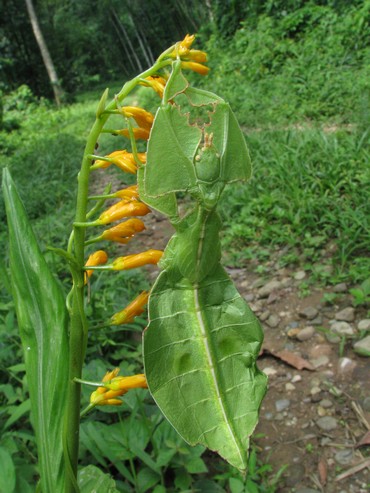
Passion: You should be able to enjoy the simple joys of watching animals and being in the field.
When there are hardships in the field and analysis starts, many times you start to question why are you doing this? It's usually your passion that sees you through.
Commitment: You need to be committed to a subject, a place, to people you've bonded with and have commitment towards the promises you've made to eahc of these.
Adaptability: Always be prepared to adapt to new cultural sensibilities, people, food habits and ways of life.
Endurance: You spend anywhere up to seven months in forests so you need to be able to stand harsh conditions.
Data collection can become monotonous, field assistants might not turn up, you might be stranded, and finally analysing data can be quite taxing mentally. You need endurance to see the entire process through.
What are your future plans?
I plan to earn a doctoral degree in wildlife biology and to try and engage in whatever way I can with wildlife conservation.
Could you share a memorable incident during your expeditions?
Once I was at Periyar with about a dozen of my classmates. At a distance we could see elephants, wild pigs, sambar, deer -- gathered at a single spot.
Suddenly we could see elephants putting away their babies, sambars, deer and wild pigs running away. It was as if the scene had suddenly changed. That's when we spotted a tiger coming out of the bush nearby.
It was amazing to see how at one moment everything was silent and the very next moment it seemed like the entire forest came alive.
No amount of money can compensate for some moments. This was one such experience.